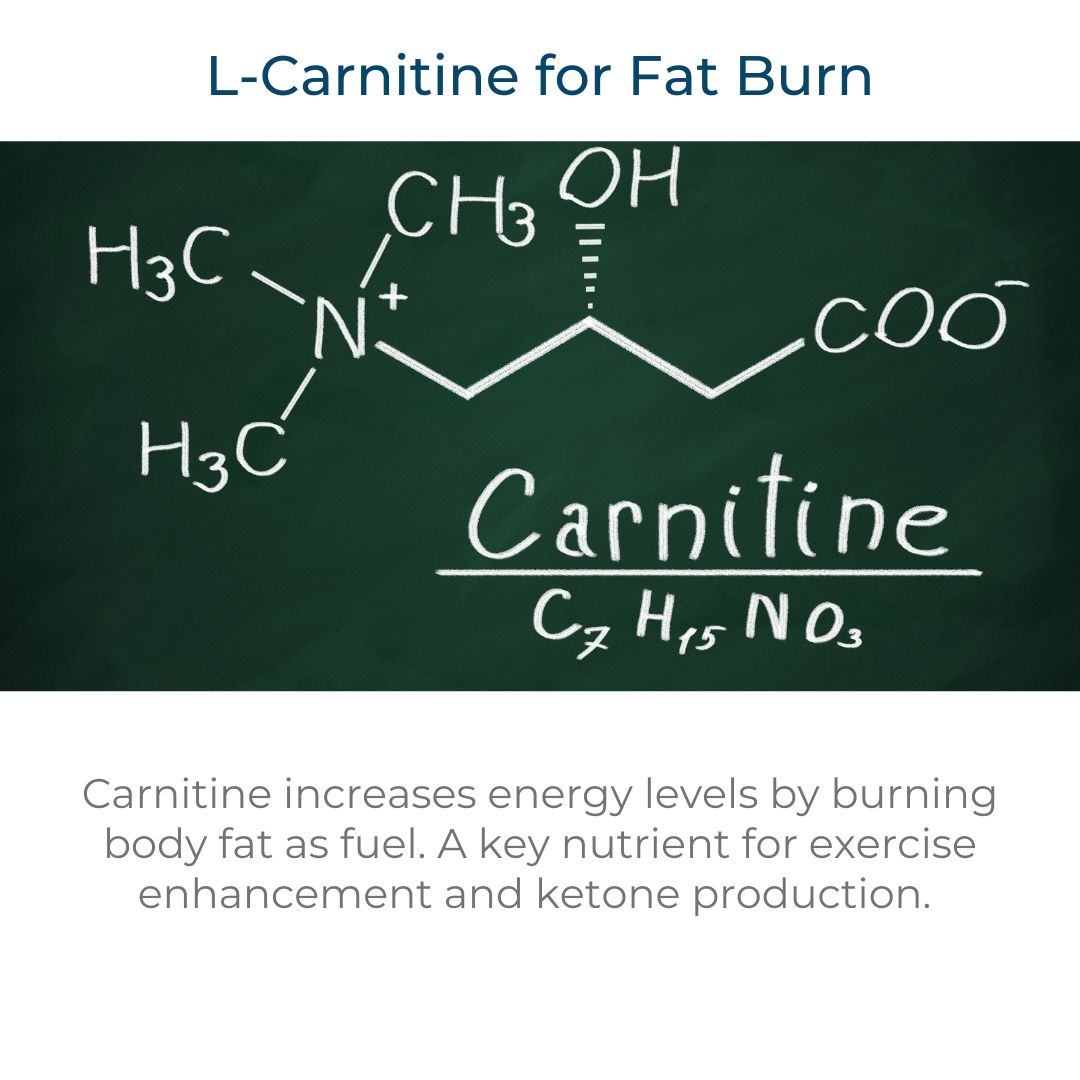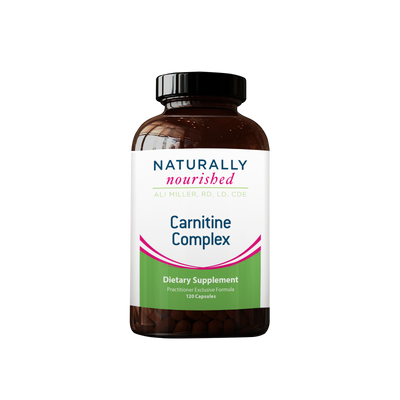
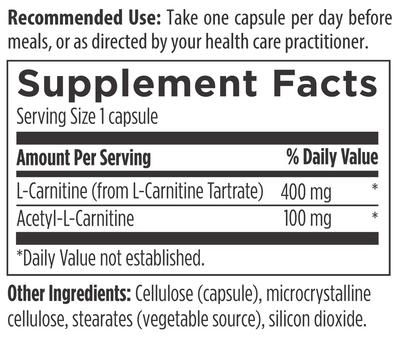
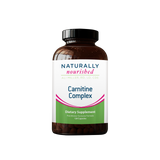
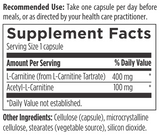
Carnitine Complex
120 Capsules
Carnitine Complex is a powerful combination of 2 forms of carnitine to aid in body fat burn, ketone production, and anti-aging brain boost
This product has replaced Boost and Burn for easier delivery and consistency of use!Learn more
Benefits of Carnitine Complex
- Increased energy
- Body fat burn
- Ketone production
- Mitochondial support
- Cardiovascular and heart health
- Blood sugar regulation
- Supports brain health
Carnitine Complex has replaced Boost and Burn for easier delivery and consistency of use!
How to Take
1 capsule at rise and 1 capsule midday, ideally taken 60 minutes away from food
If dealing with chronic fatigue, carnitine deficiency, or heart disease increase dosage to 2 capsules twice daily
Subscription & Use Tip
Contains 120 capsules which lasts 1-2 months with typical use.
Purchase a bundle and SAVE 12%! This product is also featured in Keto Essentials Bundle and Heart Health Bundle
Safety
- Safe with breastfeeding
-
Safe for Kids
Learn more
This product also supports
Energy and Performance Inflammation & Brain
What Makes Carnitine Complex Superior?
We ensure all our products have the most bioavailable form of ingredients and combine different compounds to get the most powerful effects.
Description
Boost and Burn has been reformulated and is now Carnitine Complex! This capsule formula still contains a powerful punch of carnitine without having to deal with the liquid or the taste!
Carnitine Complex uniquely combines l-carnitine and its acetylated form into each capsule in a 4:1 ratio, providing support for fat metabolism and energy production as well as brain function.
- 400 mg of L‑carnitine (from L‑carnitine tartrate) to promote optimal cellular energy production
- 100 mg of acetyl‑L‑carnitine to provide specific anti-aging support for the brain
Carnitine increases energy levels by driving body fat to be metabolized into ketones for energy production. This product is a great tool for those following a ketogenic diet program where fat is the primary energy source as often carnitine stores become depleted due to demand.
Carnitine Complex helps rev up body fat burn and enhance energy by supporting delivery of fat to the energy factories of the cells (mitochondria) and enhancing ketone production. This is 100% my preference vs. exogenous ketones as it aids in production from your own body fat stores vs. providing ketones from an outside source.
* These statements have not been evaluated by the Food and Drug Administration. This product is not intended to diagnose, treat, cure or prevent any disease.
Why Naturally Nourished
-
Potency
-
Clinical Results
-
Synergistic Formulas
-
Third Party Tested
-
Purity
Benefits
Carnitine Complex features two forms of the conditionally essential molecule of carnitine to support mitochondrial function and energy production. Carnitine is required to bring long‑chain fatty acids into the mitochondria for beta‑oxidation (the process of converting fats into cellular energy). Carnitine Complex uniquely combines L‑carnitine and its acetylated form into each capsule in a 4:1 ratio to support fatty acid metabolism and metabolic health.
Carnitine has key roles in energy production, especially in using fats as an energy source. May also promote cellular health by preventing the accumulation of long‑chain fatty acids in cells, which may cause damage. Carnitine may also support healthy glucose metabolism. Carnitine levels may be impacted by metabolism, certain medications, liver function, excretion rates or aging. Acetyl‑L‑carnitine is one of the most common metabolites of carnitine, and it can cross into the mitochondrial membrane to support energy production. Acetyl‑L‑carnitine may also support mitochondrial function and brain health.
Ingredient Highlights
• 400 mg of L‑carnitine (from L‑carnitine tartrate) to promote normal cellular energy production
• 100 mg of acetyl‑L‑carnitine to support overall health, including specific support for the brain
Carnitine and Energy Production
Carnitine, an essential water‑soluble molecule, plays a key role in energy production, especially beta‑oxidation.1,2 Carnitine and carnitine acyltransferases are involved in the transportation of acyl groups between cell organelles and into the mitochondrial matrix for beta‑oxidation.1‑3 The carnitine shuttle involves the conversion of long‑chain fatty acids into fatty acyl‑coenzyme A (CoA) and then into acylcarnitines, which can cross the inner mitochondrial membrane.3 Carnitine regulates mitochondrial enzymes by modulating the acyl‑CoA to CoA ratio.1 Acyl‑CoA synthase forms acyl‑CoA by the thioesterification of acyl groups and CoA, which is required for fatty acids to enter energy production. Carnitine acyltransferases convert acyl‑CoA into acyl‑carnitine esters, which then can be used as a pool of the acyl group.2 Carnitine can also form acetyl‑carnitine to allow for the acyl groups to be transported across cell membranes and excreted in the urine.2
The carnitine shuttle not only optimizes beta‑oxidation, but it also prevents the accumulation of long‑chain fatty acids in cells, which may cause damage.3 The disruption of beta‑oxidation is a major contributor to the accumulation of fatty acids within hepatocytes, leading to nonalcoholic fatty liver disease.4 Carnitine may enhance nonoxidative glucose metabolism.2 It may also induce the expression of peroxisome proliferator‑activated receptor‑gamma, which is associated with adipocyte differentiation and utilization of adiponectin to maintain metabolic activity and insulin sensitivity.5
The major dietary sources of carnitine are meat, poultry, fish, and dairy products. Endogenous synthesis accounts for an estimated 25% of necessary carnitine levels, which may be higher in vegetarians and vegans.1 Carnitine precursors for endogenous synthesis are lysine and methionine.1 Carnitine levels are maintained by dietary intake, endogenous synthesis, and renal reabsorption.1 Carnitine deficiency may occur due to inborn errors of metabolism that affect carnitine biosynthesis, carnitine transport, and/or mitochondrial carnitine‑acylcarnitine cycles, certain medications, or increased excretion due to conditions such as fatty acid oxidation disorders, tubular dysfunction, or dialysis.1 Certain conditions, such as liver disease, diabetes, and aging, may also affect carnitine levels.3,6
L‑carnitine tartrate is the supplemental form of the L‑isomer of carnitine found in Carnitine Synergy™. Increasing intake of carnitine may support normal cellular energy production and metabolic function.* Carnitine may also support antioxidant status and promote a healthy inflammatory response.5,7 L‑carnitine supplementation may promote redox balance by activating the Nrf2 pathway and increasing the activity of antioxidant enzymes to reduce myocardial ischemia‑reperfusion injury.8,9
In a study with 52 participants with pemphigus vulgaris, 2 g of L‑carnitine tartrate per day for 8 weeks led to a significant reduction of triglycerides, total cholesterol, and low‑density lipoprotein (LDL) cholesterol levels, and oxidative stress and a meaningful increase in total antioxidant capacity and serum carnitine levels compared to a placebo.10 A systematic review and meta‑analysis found that L‑carnitine supplementation reduced serum total cholesterol and triglycerides. There was a greater beneficial impact in long‑term supplementation of >24 weeks with doses between 900 mg/day and ≤2,000 mg/day, especially in those participants with liver disease — particularly chronic hepatitis C.
Another systematic review and meta‑analysis of 24 studies with 1,569 participants found that supplementing with L‑carnitine, especially in doses higher than 1,500 mg/day, led to improved lipid profiles, including total cholesterol, LDL and high‑density lipoprotein (HDL) cholesterol levels, in addition to improved fasting blood glucose, hemoglobin A1C, and Homeostatic Model Assessment for Insulin Resistance (HOMA‑IR) values.11 Another systematic review and meta‑analysis found that L‑carnitine supplementation led to a significant reduction of plasma levels of lipoprotein(a), a lipoprotein particle with atherogenic and thrombotic properties.12
A double‑blind, randomized, cross‑over study with 23 participants looked at the effect of L‑carnitine tartrate on glucose metabolism. The participants took 2,000 mg/day of L‑carnitine titrate in divided doses or a placebo for 36 days. Carnitine supplementation restored metabolic flexibility in impaired glucose tolerant participants to that of the normal glucose tolerant participants. It also enhanced acetylcarnitine concentration in resting muscle and the capacity to form acetylcarnitine in response to exercise.13
Carnitine supplementation may also support healthy body composition.* A systematic review and meta‑analysis reviewed data from 37 randomized controlled clinical trials using doses between 350 and 4,000 mg/day with 2,000 mg/day being the most common dose. The researchers found that L‑carnitine supplementation significantly reduced body weight, body mass index (BMI), and fat mass, with a greater impact on adults with higher BMI.5 Carnitine supplementation may also support liver health.* Systematic reviews and meta‑analyses found that L‑carnitine supplementation significantly reduced serum aspartate aminotransferase (AST), alanine aminotransferase (ALT), gamma‑glutamyl transferase (GGT), and gamma‑glutamyl transpeptidase (GGTP) levels. The greater effects were seen in the subgroups with doses higher than 2,000 mg/day for more than 12 weeks and in patients with liver diseases.4,14
Acetyl‑L‑carnitine is the acetylated form of carnitine involved in energy storage.1 Acetyl‑L‑carnitine is one of the most common metabolites of carnitine in plasma and tissues, including the brain.3 Acetyl‑L‑carnitine can cross into the mitochondrial membrane and break into L‑carnitine and acetyl‑CoA to support energy production by the tricarboxylic acid cycle.3 Acetyl‑L‑carnitine may also support mitochondrial function.* A rat study found that acetyl‑L‑carnitine ameliorated mitochondrial dysfunction and structural alternations in spinal cord injury–induced mitochondrial impairments.15
Acetyl‑carnitine may support brain health by promoting energy production and a healthy inflammatory response and supporting normal mitochondrial function, antioxidant status, and neurotransmitter transmission especially acetylcholine, gamma‑aminobutyric acid (GABA), and dopamine.*3,16 A randomized, double‑blind, placebo‑controlled trial tested supplementing with 2 g of acetyl‑L‑carnitine twice a day or a placebo for 90 days in 61 patients with severe hepatic encephalopathy. Those who took acetyl‑L‑carnitine experienced significant improvement in cognitive tests, including memory.17 A systematic review looking at data from 15 clinical trials using doses ranging from 500 mg/day to 3,000 mg/day found that acetyl‑L‑carnitine supplementation led to a significant improvement in painful peripheral neuropathy, including a reduction in pain.18 Acetyl‑L‑carnitine deficiency is associated with a major depressive disorder, especially those with treatment‑resistant depression.19 A systematic review and meta‑analysis using data from 12 randomized controlled trials with a total of 791 patients found that acetyl‑L‑carnitine significantly decreased depressive symptoms compared to a placebo or no intervention. These studies used doses ranging from 1 gram to 4 grams.20
How to Use
Research
- Carnitine Increases Endurance
- The effects of acute L-carnitine supplementation on endurance performance of athletes
- Effect of L-carnitine supplementation on endurance exercise in normobaric/normoxic and hypobaric/hypoxic conditions
- Carnitine Enhances Weight Loss & Fat Burn
- The effect of (L-)carnitine on weight loss in adults: a systematic review and meta-analysis of randomized controlled trials
- The effect of l-carnitine on fat oxidation, protein turnover, and body composition in slightly overweight subjects
- Skeletal muscle carnitine loading increases energy expenditure, modulates fuel metabolism gene networks and prevents body fat accumulation in humans - PMC
- Carnitine Prevents Muscle Damage
- Carnitine Boosts Brain Function
- L-Carnitine treatment reduces severity of physical and mental fatigue and increases cognitive functions in centenarians: a randomized and controlled clinical trial
- Double-blind, placebo controlled study of acetyl-l-carnitine in patients with Alzheimer's dementia
- Carnitine Regulates Blood Sugar & Has Application in Type 2 Diabetes
- L-carnitine improves glucose disposal in type 2 diabetic patients
- Caloric restriction and L-carnitine administration improves insulin sensitivity in patients with impaired glucose metabolism
- Carnitine May Be Useful as an Adjunct in Cardiovascular Disease
- Controlled study on L-carnitine therapeutic efficacy in post-infarction
- L-carnitine as an adjunct therapy to percutaneous coronary intervention for non-ST elevation myocardial infarction
- Does left ventricular function improve with L-carnitine after acute myocardial infarction?
- Metabolic treatment with L-carnitine in acute anterior ST segment elevation myocardial infarction. A randomized controlled trial
- L-carnitine in the secondary prevention of cardiovascular disease: systematic review and meta-analysis
- Carnitine Improves Peripheral Neuropathy
- Preventing Complications and Treating Symptoms of Diabetic Peripheral Neuropathy
- Acetyl-L-carnitine for the treatment of diabetic peripheral neuropathy
- Acetyl-L-carnitine improves pain, nerve regeneration, and vibratory perception in patients with chronic diabetic neuropathy: an analysis of two randomized placebo-controlled trials
- Carnitine Improves Depression Symptoms Comparable to Medication
- Acetyl-L-Carnitine Supplementation and the Treatment of Depressive Symptoms: A Systematic Review and Meta-Analysis
- Comparative Safety of Pharmacologic Treatments for Persistent Depressive Disorder: A Systematic Review and Network Meta-Analysis
- Carnitine Supports Sperm Quality, Concentration and Motility
- L-carnitine levels in the seminal plasma of fertile and infertile men: correlation with sperm quality
- Use of carnitine therapy in selected cases of male factor infertility: a double-blind crossover trial
- A placebo-controlled double-blind randomized trial of the use of combined l-carnitine and l-acetyl-carnitine treatment in men with asthenozoospermia
- Placebo-controlled double-blind randomized trial on the use of L-carnitine, L-acetylcarnitine, or combined L-carnitine and L-acetylcarnitine in men with idiopathic asthenozoospermia
Additional References
1. Almannai M, Alfadhel M, El‑Hattab AW. Carnitine inborn errors of metabolism. Molecules. 2019;24(18):3251. doi:10.3390/molecules24183251.
2. Adeva‑Andany MM, Calvo‑Castro I, Fernández‑Fernández C, Donapetry‑García C, Pedre‑Piñeiro AM. Significance of l‑carnitine for human health. IUBMB Life. 2017;69(8):578‑594. doi:10.1002/iub.1646.
3. Ferreira GC, McKenna MC. L‑carnitine and acetyl‑L‑carnitine roles and neuroprotection in developing brain. Neurochem Res. 2017;42(6):1661‑1675. doi:10.1007/s11064‑017‑2288‑7.
4. Pirmadah F, Ramezani‑Jolfaie N, Mohammadi M, Talenezhad N, Clark CCT, Salehi‑Abargouei A. Does L‑carnitine supplementation affect serum levels of enzymes mainly produced by liver? A systematic review and meta‑analysis of randomized controlled clinical trials. Eur J Nutr. 2020;59(5):1767‑1783. doi:10.1007/s00394‑019‑02068‑4.
5. Talenezhad N, Mohammadi M, Ramezani‑Jolfaie N, Mozaffari‑Khosravi H, Salehi‑Abargouei A. Effects of L‑carnitine supplementation on weight loss and body composition: a systematic review and meta‑analysis of 37 randomized controlled clinical trials with dose‑response analysis. Clin Nutr ESPEN. 2020;37:9‑23. doi:10.1016/j.clnesp.2020.03.008.
6. Abbasnezhad A, Hasanavand A, Falahi E, Kashkooli S, Asbaghi O, Choghakhori R. Effect of L‑carnitine supplementation on lipid profiles of patients with liver disease: a systematic review and meta‑analysis. Prev Nutr Food Sci. 2020;25(2):124‑132. doi:10.3746/pnf.2020.25.2.124.
7. Nachvak SM, Shabanpur M, Mostafai R, Heidari Moghaddam R, Moludi J. L‑Carnitine supplementation reduces biomarkers of inflammatory and oxidative stress in patients with coronary artery disease: a randomised controlled trial [published online ahead of print, Aug 20, 2020]. Arch Physiol Biochem. 2020;1‑8. doi:10.1080/13813455.2020.1797102
8. Zhao T, Chen S, Wang B, Cai D. L‑Carnitine reduces myocardial oxidative stress and alleviates myocardial ischemia‑reperfusion injury by activating nuclear transcription‑related factor 2 (Nrf2)/heme oxygenase‑1 (HO‑1) signaling pathway. Med Sci Monit. 2020;26:e923251. doi:10.12659/MSM.923251.
9. Li M, Xu S, Geng Y, et al. The protective effects of L‑carnitine on myocardial ischaemia‑reperfusion injury in patients with rheumatic valvular heart disease undergoing CPB surgery are associated with the suppression of NF‑κB pathway and the activation of Nrf2 pathway. Clin Exp Pharmacol Physiol. 2019;46(11):1001‑1012. doi:10.1111/1440‑1681.13155.
10. Mohammadi H, Djalali M, Daneshpazhooh M, et al. Effects of L‑carnitine supplementation on biomarkers of oxidative stress, antioxidant capacity and lipid profile, in patients with pemphigus vulgaris: a randomized, double‑blind, placebo‑controlled trial [published online ahead of print, Aug 23, 2017]. Eur J Clin Nutr. 2017;10.1038/ejcn.2017.131. doi:10.1038/ejcn.2017.131.
11. Asadi M, Rahimlou M, Shishehbor F, Mansoori A. The effect of L‑carnitine supplementation on lipid profile and glycaemic control in adults with cardiovascular risk factors: a systematic review and meta‑analysis of randomized controlled clinical trials. Clin Nutr. 2020;39(1):110‑122. doi:10.1016/j.clnu.2019.01.020.
12. Serban MC, Sahebkar A, Mikhailidis DP, et al. Impact of L‑carnitine on plasma lipoprotein(a) concentrations: a systematic review and meta‑analysis of randomized controlled trials. Sci Rep. 2016;6:19188. doi:10.1038/srep19188.
13. Bruls YM, de Ligt M, Lindeboom L, et al. Carnitine supplementation improves metabolic flexibility and skeletal muscle acetylcarnitine formation in volunteers with impaired glucose tolerance: a randomised controlled trial. EBioMedicine. 2019;49:318‑330. doi:10.1016/j.ebiom.2019.10.017.
14. Askarpour M, Djafarian K, Ghaedi E, Sadeghi O, Sheikhi A, Shab‑Bidar S. Effect of L‑carnitine supplementation on liver enzymes: a systematic review and meta‑analysis of randomized controlled trials. Arch Med Res. 2020;51(1):82‑94. doi:10.1016/j.arcmed.2019.12.005.
15. Zhang ZY, Fan ZK, Cao Y, et al. Acetyl‑L‑carnitine ameliorates mitochondrial damage and apoptosis following spinal cord injury in rats. Neurosci Lett. 2015;604:18‑23. doi:10.1016/j.neulet.2015.06.021.
16. Traina G. The neurobiology of acetyl‑L‑carnitine. Front Biosci (Landmark Ed). 2016;21:1314‑1329. doi:10.2741/4459.
17. Malaguarnera M, Vacante M, Motta M, et al. Acetyl‑L‑carnitine improves cognitive functions in severe hepatic encephalopathy: a randomized and controlled clinical trial. Metab Brain Dis. 2011;26(4):281‑289. doi:10.1007/s11011‑011‑9260‑z.
18. Di Stefano G, Di Lionardo A, Galosi E, Truini A, Cruccu G. Acetyl‑L‑carnitine in painful peripheral neuropathy: a systematic review. J Pain Res. 2019;12:1341‑1351. doi:10.2147/JPR.S190231.
19. Nasca C, Bigio B, Lee FS, et al. Acetyl‑L‑carnitine deficiency in patients with major depressive disorder. Proc Natl Acad Sci U S A. 2018;115(34):8627‑8632. doi:10.1073/pnas.1801609115.
20. Veronese N, Stubbs B, Solmi M, Ajnakina O, Carvalho AF, Maggi S. Acetyl‑L‑carnitine supplementation and the treatment of depressive symptoms: a systematic review and meta‑analysis. Psychosom Med. 2018;80(2):154‑159. doi:10.1097/PSY.0000000000000537.
Carnitine Complex
120 Capsules
